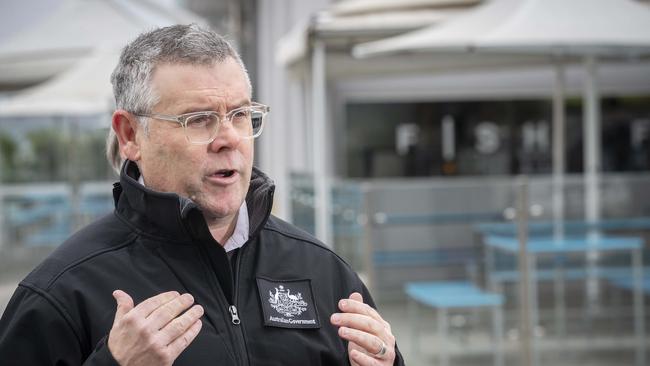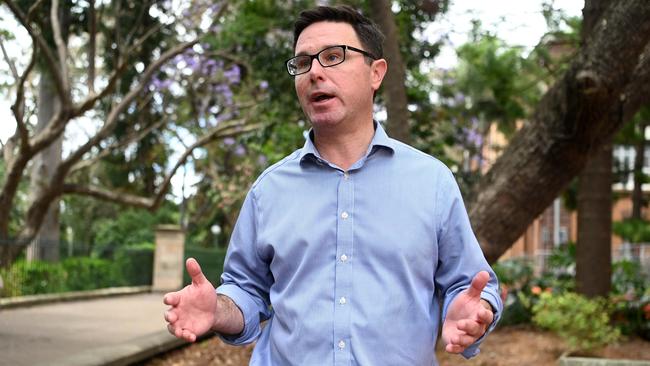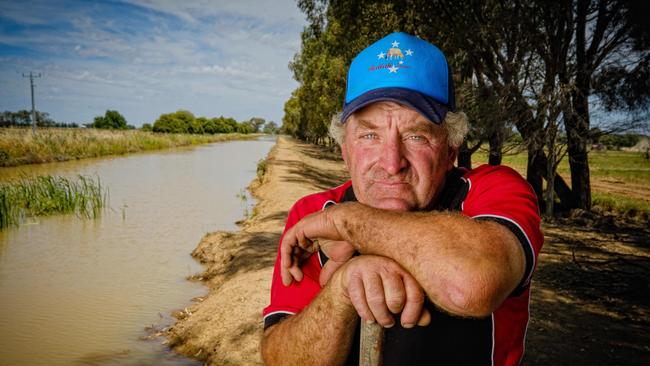Agirculture leaders and farmers respond to Australia’s support for global methane pledge
Despite an assurance from Agriculture Minister Murray Watt, farmers are worried a “burp tax” like the one proposed for New Zealand could be replicated here.
Farmers are concerned the federal government will sign up to a global pledge to cut methane emissions and impose punitive measures similar to New Zealand’s “burp tax” to ensure the industry’s compliance.
The fears come after Agriculture Minister Murray Watt on Thursday indicated his support for the US’s global methane pledge.
Mr Watt has been consulting with farmers and farming lobby groups including the National Farmers’ Federation, Meat and Livestock Australia and Farmers for Climate Action about his government’s intention to sign up to the agreement.
The agreement commits signatories to voluntary actions to reduce methane emissions by 30 per cent from 2020 levels by 2030.

Mr Watt has been at pains this week to stress the agreement was an aspirational goal that he said had widespread support among the farming industry.
But NFF chief executive Tony Mahar said the federal government’s interest in signing up to the pledge had given farmers cause for concern.
“NFF is actively engaged in discussions with the Australian government about its approach to the methane pledge,” Mr Mahar said in a statement.
“We’ve sought several assurances to guarantee that any decision to sign the pledge would not negatively impact farmers. These include: no new taxes or regulation on livestock methane; recognition of agriculture’s existing plans and progress; and ongoing support to develop technology-led solutions.
“We’ve been given these assurances and it’s important they be upheld if and when a formal commitment is made, otherwise trust with the farming sector and rural and regional Australia will be broken.”
United Dairy Farmers of Victoria president Mark Billing said farmers were understandably concerned given New Zealand’s plan unveiled last week to impose a levy on farmers’ emissions from their herds following its signing of the US’s pledge.
“Until we fully understand the implications, farmers are very concerned, and of course we’re looking over The Ditch to New Zealand,” Mr Billing said.
While Mr Watt told ABC radio on Thursday the federal government “had no plans to introduce that system here”, Mr Billing said he was wary of the potential for politicians to change their mind.

Nationals leader David Littleproud has warned becoming a signatory to the global methane pledge risked “the great Aussie barbecue” due to the likelihood of retail price rises.
He told The Weekly Times there were only two ways for farmers to reduce emissions, either introduce a New Zealand-style tax or reduce herd numbers, because success was yet to be commercially proven with the use of feed additives.
Mr Watt said agriculture could reduce its methane emissions by widening the use of a red seaweed called asparagopsis as a livestock feed supplement.
“I’ve spoken to some of the players trialling this (asparagopsis) and unfortunately the economics aren’t there. It’s costing them too much to get the results they were hoping for,” Mr Littleproud said.
“The only other way is to reduce your herd, reduce supply, and if you do that, supply and demand principles say you lift prices. We’re already seeing that with fruit and veg, they’re (farmers) not planting as much, they don’t have the confidence to pick so supply has gone down and price has gone up.”
NSW Farmers has voiced its opposition to Australia’s signing of the pledge, which chief executive Peter Arkle has blamed for “killing small towns” in New Zealand.
Mr Arkle said herd reduction was the only practical tool farmers had to reduce methane emissions given the limited availability of “low methane” stock feed, which was being trialled by some of the nation’s biggest livestock producers including AACo and Parway Pastoral.
“Our sector is highly exposed to any change in climate – you only need to look at the weather we’ve seen this year – and we are prepared to do our part, but at the moment there’s not much we can do on methane reduction but reduce the national herd,” he said.
Minister Watt has not given an indication of when the government will sign the global methane pledge.
Thursday October 13
Speaking to ABC radio on Thursday, Mr Watt said: “I would be comfortable if we were to sign up to this (pledge).”
Under the agreement, participants commit to voluntary actions to cut methane emissions by 30 per cent from 2020 levels by 2030.
Mr Watt emphasised that the agreement was an “aspirational goal” and ruled out placing a price on methane emissions as New Zealand announced it would this month.
National Party MP David Littleproud on Thursday took to Twitter, saying “the Aussie barbecue is under threat” from the pledge, which he claimed would drive up meat prices.
Labor “couldn’t be trusted” not to tax farmers, despite Mr Watt’s commitment that he wouldn’t, Mr Littleproud said.

Gippsland dairy farmer Daryl Hoey said Mr Littleproud’s opposition to the pledge didn’t make sense.
The 30 per cent methane pledge target was less ambitious than what industry groups were already working towards, Mr Hoey said.
“It’s not the livestock industry which is the issue here. There is a lot of work and investment going into reducing methane emissions from livestock through feed additives,” he said.
“Gas wells that are untapped are the major problem here.”
Australia’s livestock industry is the country’s biggest producer of methane emissions at 48 per cent of the total, but industry groups have already set voluntary targets to slash their total greenhouse gas emissions, including methane emissions, to neutral by 2030.
Labor’s support for the 2030 methane emissions pledge will hurt farmers and cost customers more at the checkout. pic.twitter.com/9SEi6gCCcc
— David Littleproud MP (@D_LittleproudMP) October 12, 2022
Meat and Livestock Australia committed to its carbon neutral target in 2017, and has since achieved almost 60 per cent of the target, mostly through changed land use practices.
Speaking to The Weekly Times earlier this week, CN30 project manager Julia Waite said the industry was well on the way to slashing its methane emissions through innovative technologies.
MLA has set a target of 100 per cent of Australia’s feedlot industry adopting methane-reducing feed additives by 2030, and 50 per cent of grazed cattle adopting supplements.
Feed additives such as asparagopsis – a type of seaweed – have been proven to cut enteric methane emissions produced by livestock by up to 98 per cent in laboratory trials.
Australia’s fossil fuel industry is the country’s second highest methane emitter at 28 per cent of the total.
MLA managing director Jason Strong said the industry was “at the forefront of delivering a science-based plan to reach CN30 without compromising productivity or livestock numbers”.
National Farmers’ Federation chief executive Tony Mahar said in a statement on Thursday the Australia’s livestock industry success so far in reducing its greenhouse gas emissions showed it was working towards ambitious targets.
“Farmers are already leading the charge on climate action in Australia and have earned a seat at the table when these decisions are being made,” Mr Mahar said.
NFF had received government assurance Australia’s support for the methane pledge would not lead to a reduction in livestock numbers, he said.
“Given the number of sectors that emit methane, any implementation measures can’t simply be targeted at agriculture,” Mr Mahar said.
“For agriculture, the best way to reduce emissions further is to arm us with cost-effective technology solutions – not to pursue punitive taxes or regulate farmers out of existence.
“Agriculture and farmers are critical players in the climate change discussion and what we have seen overseas is commitments that will compromise the ability for the agriculture sector to grow. We want to learn from those scenarios and make sure industry and government work together to enable sustainable growth,” Mr Mahar said.
Farmers for Climate Action said in a statement it backed the pledge.
- By Else Kennedy
More Coverage
Fergus said: “The gas industry needs to be asked to tighten their belts rather than the mum and dad farmers who are already doing enormous sequestering of carbon, through tree planting and rotational grazing and planting of mixed pasture species." pic.twitter.com/6KTir1tw51
— Farmers for Climate Action (@farmingforever) October 13, 2022



